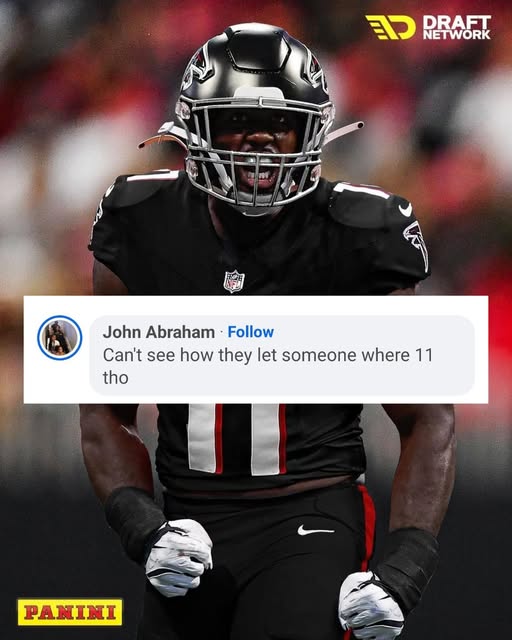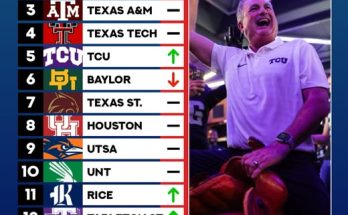**Former Atlanta Falcons Great John Abraham Isn’t a Fan of the Team Giving Away Julio Jones’ Famous #11 to Rookie Jalon Walker**
The Atlanta Falcons have always been a franchise steeped in tradition, with legendary players leaving an indelible mark on the organization. Few players have embodied the Falcons’ identity over the past decade more than Julio Jones, the dominant wide receiver whose electrifying play made him one of the greatest to ever wear the red and black. So when news broke that the Falcons had reassigned Jones’ iconic #11 to rookie linebacker Jalon Walker, it sparked immediate debate—and one of the franchise’s all-time greats, John Abraham, made it clear he wasn’t happy about it.
Abraham, a three-time Pro Bowl pass rusher and one of the most feared defensive players in Falcons history, took to social media to voice his displeasure. His stance isn’t just about a number—it’s about respect, legacy, and how franchises honor their legends. While some may argue that jersey numbers are just digits, Abraham’s reaction underscores a deeper sentiment: certain players transcend the game, and their numbers should be treated with reverence.Julio Jones wasn’t just a great player for the Falcons—he was a transformative figure. Drafted sixth overall in 2011, Jones quickly established himself as one of the most dominant receivers in NFL history. His combination of size, speed, and hands made him nearly unstoppable, and his connection with quarterback Matt Ryan was the engine behind Atlanta’s high-powered offense for a decade. Jones holds multiple franchise records, including most receiving yards in a single season (1,871 in 2015) and most career receiving yards (12,896). He was a seven-time Pro Bowler, two-time First-Team All-Pro, and played a pivotal role in the Falcons’ 2016 Super Bowl run.
For many fans, #11 isn’t just a number—it’s a symbol of excellence. Retiring a jersey isn’t just about acknowledging past greatness; it’s about preserving the identity of a franchise. While the Falcons haven’t officially retired Jones’ number, many believed it would remain untouched out of respect, at least for a significant period. Instead, less than three years after Jones’ departure, a rookie has been handed the digits—a move that feels premature to many, including Abraham.John Abraham knows what it means to be a Falcons legend. From 2006 to 2012, he terrorized opposing quarterbacks, racking up 68.5 sacks in Atlanta—second only to Claude Humphrey in franchise history. His 133.5 career sacks rank 13th all-time in the NFL, and his dominance earned him a spot in the Falcons’ Ring of Honor. When Abraham speaks about how the organization should treat its icons, his words carry weight.
His reaction wasn’t just about nostalgia—it was about principle. In an era where player legacies are often commodified, Abraham’s stance reflects a belief that franchises should do more to honor those who built their success. The Falcons have retired only one number in their history—Steve Bartkowski’s #10—despite having multiple Hall of Fame-caliber players. While not every great player’s number needs to be retired, some, like Jones’, feel too significant to simply recycle without acknowledgment.The debate over retiring numbers isn’t new. Some franchises, like the Chicago Bears and Pittsburgh Steelers, are notoriously selective, reserving the honor for only the most transcendent players. Others, like the New York Yankees in MLB, have multiple retired numbers, creating a visible link between past and present greatness. The Falcons have historically leaned toward the conservative side, but Jones’ case is compelling.
Opponents of retiring numbers argue that with only 99 available digits (0-98 in the NFL), teams can’t afford to take too many out of circulation. They also point out that honoring a player doesn’t necessarily require number retirement—Ring of Honor inductions, statue installations, or other tributes can suffice. However, supporters counter that certain players redefine what a number means to a franchise. When fans see #11, they don’t think of just any player—they think of Julio Jones. Giving it to a rookie, no matter how promising, diminishes that connection.It’s important to note that Jalon Walker, the rookie now wearing #11, isn’t at fault here. The linebacker, drafted in the fourth round out of North Carolina, had no say in the number assignment. If anything, he’s stepping into an awkward situation where a number carries more weight than usual. Some players thrive under that pressure—others find it an unnecessary distraction.
Walker has potential, and if he develops into a star, the conversation around #11 could shift. But the issue isn’t about Walker’s ability—it’s about timing. Julio Jones’ legacy in Atlanta is still fresh. He last played for the Falcons in 2020, and while his exit was messy (a trade to the Tennessee Titans amid contract disputes), his impact on the franchise is undeniable. Handing his number to a rookie so soon feels like a missed opportunity to honor that legacy properly.Looking around the league, other franchises have taken different approaches to iconic numbers. The Green Bay Packers famously retired #4 the moment Brett Favre left, only to unretire it for Aaron Rodgers—a move that initially drew criticism but ultimately worked due to Rodgers’ own legendary status. The New England Patriots haven’t officially retired Tom Brady’s #12, but no player has worn it since his departure, signaling an unofficial retirement.
The Falcons could have taken a similar approach with #11—either retiring it outright or letting it sit unused for a few more years as a sign of respect. Instead, by reassigning it so quickly, they risk sending a message that even the greatest players are easily replaceable. In a league where loyalty is already scarce, that’s a dangerous precedent to set.At its core, this debate isn’t just about Julio Jones or #11—it’s about how NFL franchises choose to honor their history. Players like Jones, Abraham, and others didn’t just put up stats; they defined eras, brought fans to their feet, and helped build the Falcons’ identity. Treating their contributions as fleeting rather than foundational undermines what makes sports fandom meaningful.
John Abraham’s reaction is a reminder that players care about these things. They notice when franchises honor—or disregard—their legends. If the Falcons want to foster a culture where current players feel valued long after they retire, they might want to reconsider how they handle the numbers of icons like Julio Jones. Because once a number is given away, you can’t take it back—and some legacies deserve more than just a passing acknowledgment.



